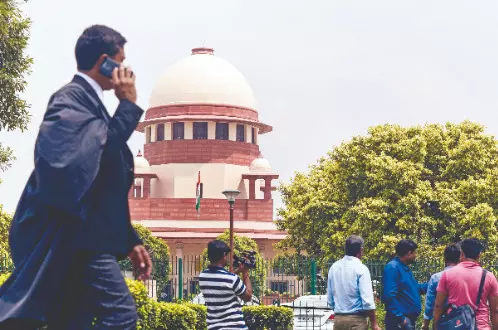Syllabus:
GS-2: Structure, organization and functioning of the Executive and the Judiciary – Ministries and Departments of the Government; pressure groups and formal/informal associations and their role in the Polity.
Context:
The Supreme Court of India has delivered a landmark judgment safeguarding the independence of the legal profession by ruling that lawyers cannot be summoned by investigating agencies merely for the legal advice they provide to their clients.
Key Highlights of the Judgement
Advocate-Client Privilege:
- Section 132 of the Bharatiya Sakshya Adhiniyam (BSA), 2023 enshrines the privilege protecting confidential communications between a lawyer and client from disclosure without client consent.
- This privilege safeguards against self-incrimination (Article 20(3)) and preserves the confidentiality essential to effective legal representation.
- The privilege extends to legal advice, opinions, and documents shared within the professional relationship but excludes communications made in furtherance of criminal acts.
Procedural Directions:
- Prior written approval from a senior police officer (not below Superintendent rank) is mandatory, with reasons recorded, to prevent abuse of power.
- No blanket guidelines for magistrate approval before summons, but strict procedural checks like senior officer approval imposed.
- Digital devices of lawyers require judicial supervision for seizure or searches per Section 94 of the BSA to protect privacy.
Limitations on Summons to Lawyers:
- Summons are only valid if exceptions under Section 132 apply, such as when a lawyer is involved beyond professional duties in alleged criminal activity.
- Section 132 does not shield the production of documents or material evidence.
- Any summons issued will be open to judicial review under Section 528 of the Bharatiya Nagarik Suraksha Sanhita (BNSS).
- The privilege extends to lawyers engaged in litigation as well as advisory work.
Key Implications of the Judgement
- Protection of Fair Trial and Confidentiality: The judgment reinforces the constitutional right to a fair trial by safeguarding the confidentiality of legal advice, which is essential for an effective defence and for allowing advocates to function without fear.
- Safeguard against the beck-and-call of probe agencies: It prevents potential misuse of investigative powers by ensuring lawyers are not intimidated or harassed by probe agencies, addressing long-standing concerns about threats to bar independence.
- Balanced Approach to Privilege and Accountability: By preserving core advocate-client privilege while allowing exceptions where lawyers are complicit in criminal activity, the ruling maintains investigative effectiveness without compromising legal ethics.
- Establishing Uniform National Standards: The judgment creates a consistent national framework for all investigative bodies—police and specialised agencies alike thus enhancing procedural clarity and uniformity.
- Judicial Commitment to Rule of Law: It signals the judiciary’s continued commitment to uphold professional safeguards and the rule of law, even as investigative frameworks evolve under legislation like the Bharatiya Sakshya Adhiniyam, 2023.

